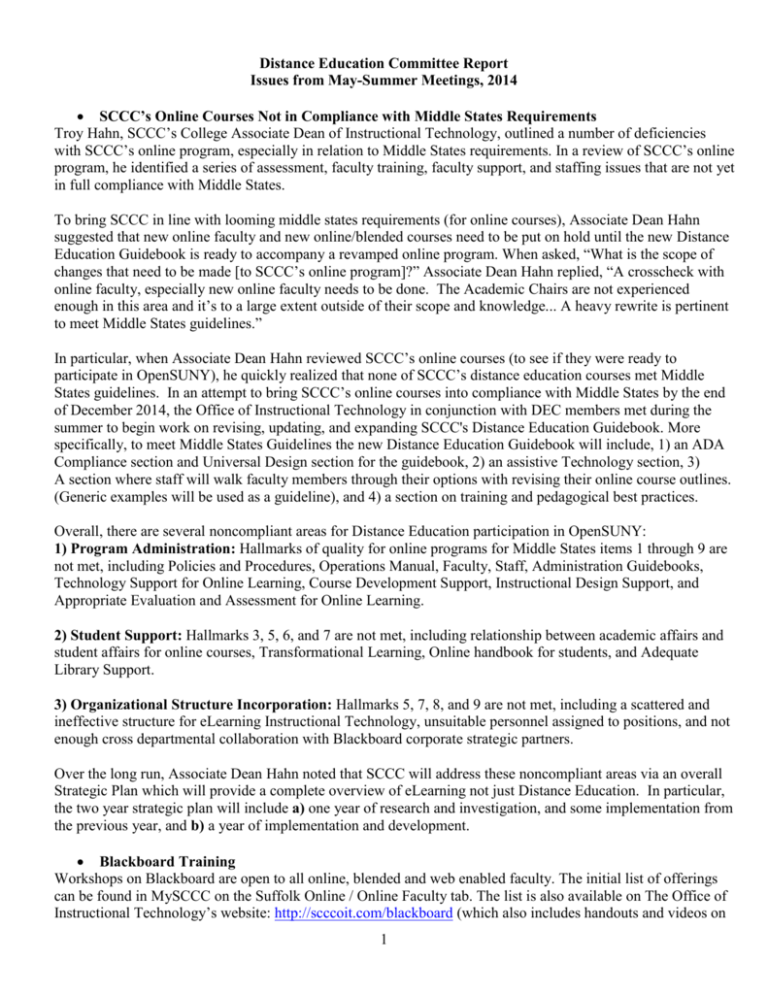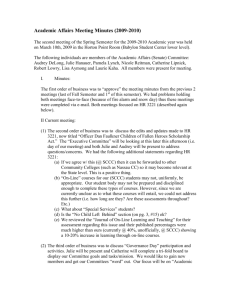DE Committee
advertisement

Distance Education Committee Report Issues from May-Summer Meetings, 2014 SCCC’s Online Courses Not in Compliance with Middle States Requirements Troy Hahn, SCCC’s College Associate Dean of Instructional Technology, outlined a number of deficiencies with SCCC’s online program, especially in relation to Middle States requirements. In a review of SCCC’s online program, he identified a series of assessment, faculty training, faculty support, and staffing issues that are not yet in full compliance with Middle States. To bring SCCC in line with looming middle states requirements (for online courses), Associate Dean Hahn suggested that new online faculty and new online/blended courses need to be put on hold until the new Distance Education Guidebook is ready to accompany a revamped online program. When asked, “What is the scope of changes that need to be made [to SCCC’s online program]?” Associate Dean Hahn replied, “A crosscheck with online faculty, especially new online faculty needs to be done. The Academic Chairs are not experienced enough in this area and it’s to a large extent outside of their scope and knowledge... A heavy rewrite is pertinent to meet Middle States guidelines.” In particular, when Associate Dean Hahn reviewed SCCC’s online courses (to see if they were ready to participate in OpenSUNY), he quickly realized that none of SCCC’s distance education courses met Middle States guidelines. In an attempt to bring SCCC’s online courses into compliance with Middle States by the end of December 2014, the Office of Instructional Technology in conjunction with DEC members met during the summer to begin work on revising, updating, and expanding SCCC's Distance Education Guidebook. More specifically, to meet Middle States Guidelines the new Distance Education Guidebook will include, 1) an ADA Compliance section and Universal Design section for the guidebook, 2) an assistive Technology section, 3) A section where staff will walk faculty members through their options with revising their online course outlines. (Generic examples will be used as a guideline), and 4) a section on training and pedagogical best practices. Overall, there are several noncompliant areas for Distance Education participation in OpenSUNY: 1) Program Administration: Hallmarks of quality for online programs for Middle States items 1 through 9 are not met, including Policies and Procedures, Operations Manual, Faculty, Staff, Administration Guidebooks, Technology Support for Online Learning, Course Development Support, Instructional Design Support, and Appropriate Evaluation and Assessment for Online Learning. 2) Student Support: Hallmarks 3, 5, 6, and 7 are not met, including relationship between academic affairs and student affairs for online courses, Transformational Learning, Online handbook for students, and Adequate Library Support. 3) Organizational Structure Incorporation: Hallmarks 5, 7, 8, and 9 are not met, including a scattered and ineffective structure for eLearning Instructional Technology, unsuitable personnel assigned to positions, and not enough cross departmental collaboration with Blackboard corporate strategic partners. Over the long run, Associate Dean Hahn noted that SCCC will address these noncompliant areas via an overall Strategic Plan which will provide a complete overview of eLearning not just Distance Education. In particular, the two year strategic plan will include a) one year of research and investigation, and some implementation from the previous year, and b) a year of implementation and development. Blackboard Training Workshops on Blackboard are open to all online, blended and web enabled faculty. The initial list of offerings can be found in MySCCC on the Suffolk Online / Online Faculty tab. The list is also available on The Office of Instructional Technology’s website: http://scccoit.com/blackboard (which also includes handouts and videos on 1 Blackboard). Additional material will be made available on an on-going basis. Help documents for students are located on the tab labeled, “Students”: http://scccoit.com/students. Blackboard Collaborate at SCCC Since Blackboard Collaborate (a web conferencing tool) is included in the price SCCC pays for Blackboard, it alleviated funding from the Technology Fees that paid full expense for Films on Demand as well as some of the funds that were allocated to purchase projectors. A small pilot is being run this fall in Blackboard Collaborate. The Office of Instructional Technology expects Blackboard Collaborate to be available to all college administrators and faculty by spring 2015. Several areas/departments at the College have started using or are interested in using Blackboard Collaborate, including: Title III Advising and Tutoring online; the Nursing Dept. at Ammerman; the Eastern Campus’ Academic Skills Center/Tutoring Online; the Student Technology Fee Committee; and student information sessions for recruiting. The next DEC meeting will be held on Oct. 2, 2014. 2


